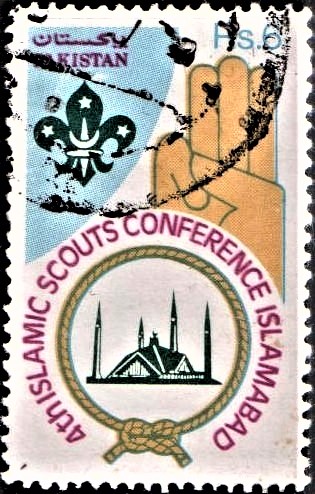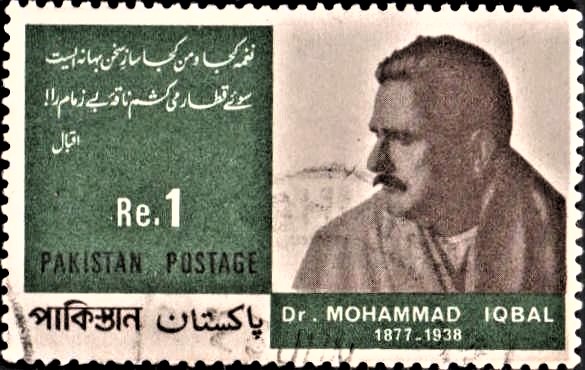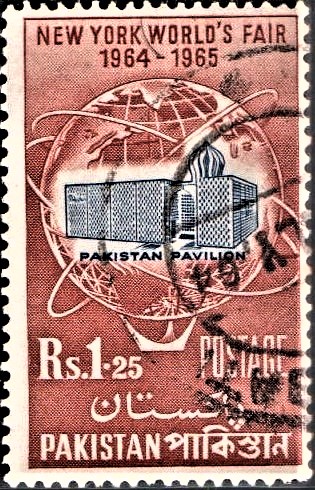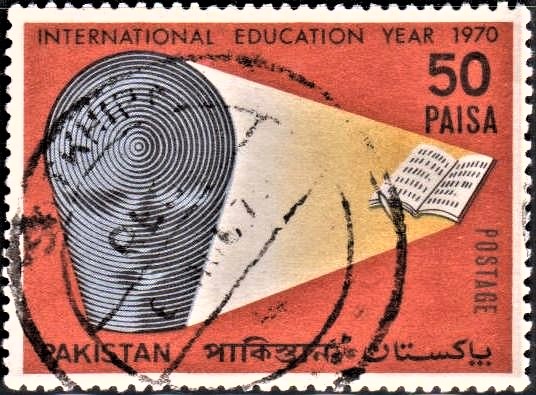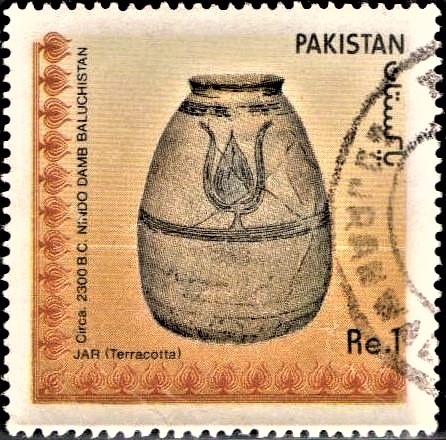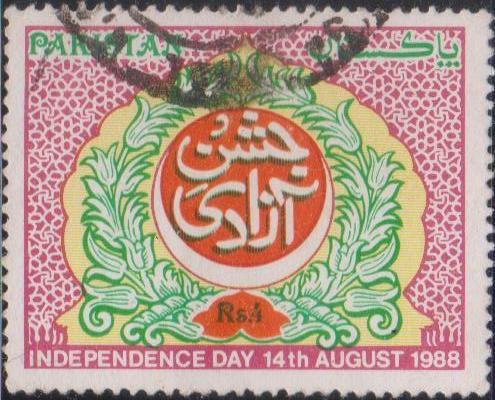
Pakistan Independence Day 1988
Complete set of 2 nos. of commemorative postage stamp on the 41st Anniversary of Independence :
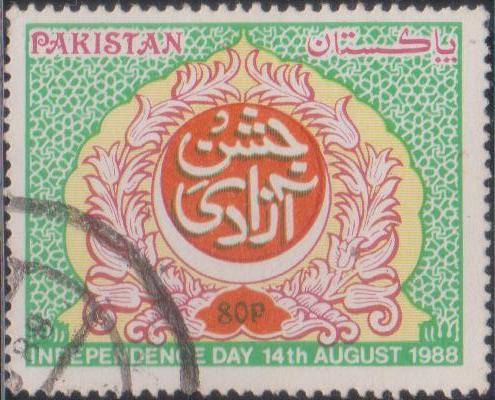
 Issued by Pakistan
Issued by Pakistan
Issued on Aug 14, 1988
Issued for : To commemorate the 41st anniversary of the birth of Islamic Republic of Pakistan, the Pakistan Post Office is issuing a set of 2 stamps of paisa 80 & Rs. 4.00 denominations on 14th August 1988.
Designer : Adil Salahuddin
Type : Stamps, Postal Used
Denominations : 80 Paisa and Rs. 4/-
Colours : Multi colours
Size of Stamps : 41 x 33 mm
Size of print : 37 x 29 mm
Perforation : 13C
Quantity : One million each value
No. of stamps in one sheet : 28 (twenty eight)
Process of printing : Litho Offset
Printer : Pakistan Security Printing Corporation
About :
- The first brick in the foundation of Pakistan was laid in 712 A.D. when Mohammad Bin Qasim anchored at Debal Port (now known as Karachi), freed the Muslim women and children from the prisons of Raja Dahir and constructed the first mosque at the town. Quaid-e-Azam Mohammad Ali Jinnah, the Founder of Pakistan, acclaimed the event by stating : “the Pakistan Movement started when the first Muslim put his foot on the soil of Sind – the Gateway of Islam in India”.
- The Pakistan Movement was synonymous with the very spirit of Islam. The War of Independence in 1857 was an open manifestation of the Muslim spirit of revolt against the domination of the British Government and its stooges in India. Frustration and lack of direction, however, pervaded the ranks of Muslims after the unfortunate failure in the War. At this critical juncture emerged Sir Syed Ahmed Khan who served as a beacon of light for the Muslim Nation in distress and disarray. He equated education with power and declared that the Muslims could improve their political, social and economic condition only through the medium of modern and scientific education. He cultivated the concept of a separate Muslim Nation on the basis of religion, culture and history. He inspired the Muslims of the sub-continent to demand a separate homeland where they could arrange their lives and affairs of the state according to the dictates of Holy Quran and Sunnah.
- After the establishment of the Indian National Congress in 1885, the Muslim leaders saw through the game of “national” movement and warned their people of the hovering dangers. In 1906, the Muslim League was founded as a challenge to the Indian National Congress. Maulana Hasrat Mohani presented a plan to the Government envisaging two separate states for the Hindus and Muslims. Chaudhary Rehmat Ali further developed this concept. He displayed great wisdom and foresight by putting forth not only a name but in large measure the scheme that culminated in the creation of Pakistan. Maulana Mohammad Ali, Maulana Shaukat Ali and Maulana Zafar Ali Khan spread the message of Pakistan through their lucid lectures and articles in newspapers.
- The most outstanding contribution, however, came from Dr. Sir Mohammad Iqbal, the great philosopher and poet and the symbol of Muslim nationalism, Pakistan ideology found ever clearer expression in his religio-philosophical, didactic and poetic works. As its base was the idea that spiritual unity founded on Islam was the most vital and integral element of national society, Islam emerges in this ideology as a form of national unity and absorbs all political thoughts. While presiding over the session of the All India Muslim League at Allahabad in 1930, Dr. Iqbal’s address represented the first clarion call for the establishment of an independent Islamic State in the subcontinent.
- From 1937 onwards, Mr. Mohammad Ali Jinnah became identified in the Muslim mind with the concept of the charismatic community, the concept which answered their psychic need for endowing and sanctifying their sense of community with a sense of power. Increasingly he become the embodiment of Muslim national consensus. And this explains why Muslims acknowledged him as their Quaid-e-Azam even before the launching of the Pakistan demand in March 1940. From now on events moved fast. Due to the persistent intransigence of the Indian National Congress the Muslims were left with no alternative but to demand the partition of the sub-continent through the famous Lahore Resolution of 23 March 1940. It declared that no constitutional plan would be workable in the country or acceptable to the Muslims unless it was designed on the basic principle that geographically contiguous units were demarcated into regions in a manner that the areas in which the Muslims were numerically in a majority were grouped together to constitute an independent state.
- After a hard and heroic struggle by the Muslims of the sub-continent, the British Parliament was forced to approve the Indian Independence Act, 1947 leading to the birth of Pakistan on 14th August 1947. On this historic day, the Quaid-e-Azam while addressing the first session of Constituent Assembly of Pakistan in Karachi eulogised the services and sacrifices of the Muslims of the sub-continent to achieve Pakistan, in the following words:–“My thoughts are with the valiant fighters in our cause who readily sacrificed all they had, including their lives, to make Pakistan possible”.
- Thus the response of the millions of Muslims, sacrificing their lives and homes, to the call of unity, faith and discipline from their Quaid-e-Azam firmly placed Pakistan on the world map.
- The Quaid-e-Azam was a great man and a great Muslim. He vehemently advocated morality in politics. He declared that morality in politics was even more important than in private life because if you do something wrong in public you hurt and harm more people. He firmly believed in the Islamic system of Government in which sovereignty belongs to Allah the Almighty. Quaid-e-Azam, therefore, affirmed the basic principles of an Islamic State by stating:“Fundamentally, in an Islamic State, all authority rests with Allah the Almighty. The Government business is conducted according to the Quranic principles and injunctions. Neither the Head nor the Parliament nor an individual nor an institution can act absolutely in any matter. Only the Quranic injunctions control our behaviour in society and politics. In other words, Islamic democracy is indeed the rule of Shariat laws”.
- The present Government is earnestly endeavouring to translate the thoughts of Quaid-e-Azam into reality.
- Issued by The Director General, Pakistan Post Office, Islamabad.
Subscribe
Login
0 Comments


